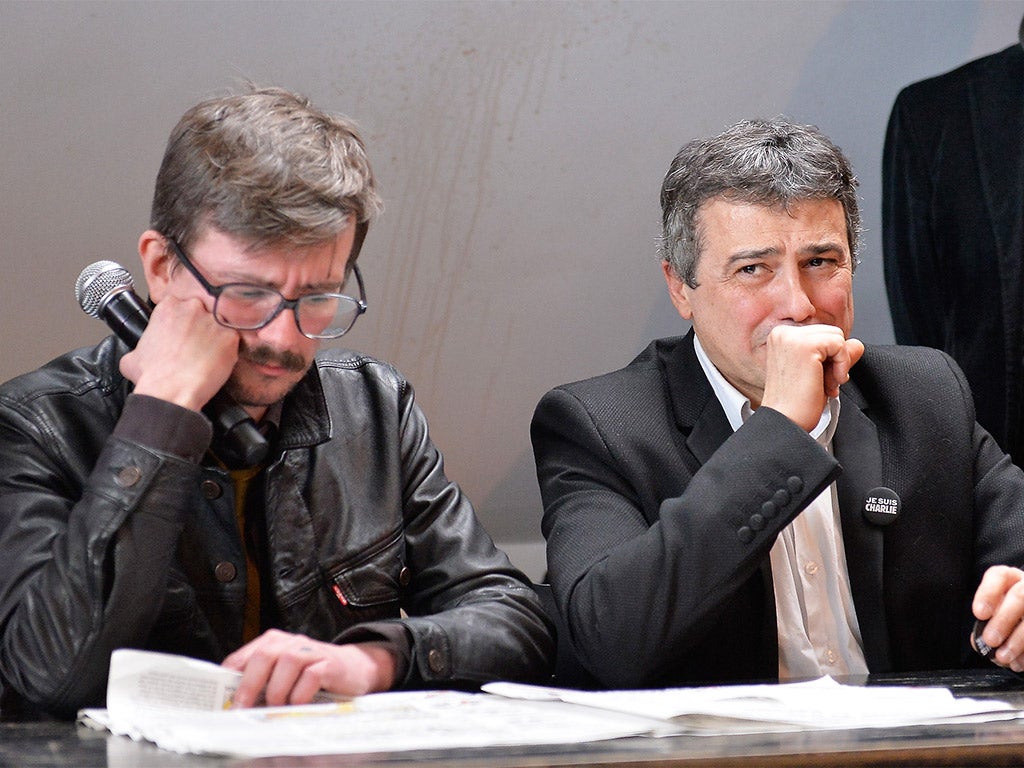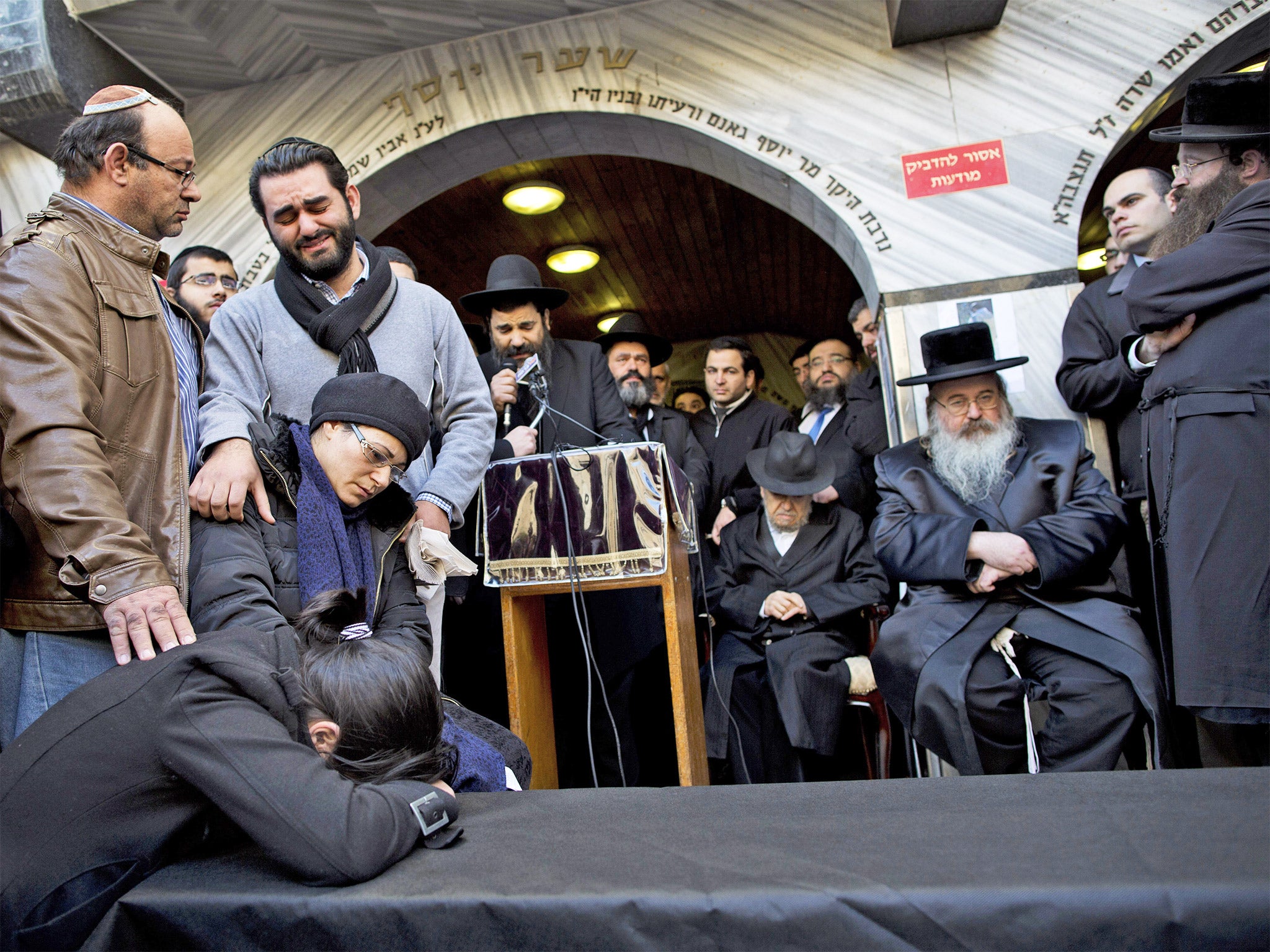Charlie Hebdo front cover: Magazine's surviving journalists refuse to apologise for latest edition featuring 'adorable' Prophet Mohamed
First, post-massacre edition, shows a tearful Prophet, while slain police are honoured by President Hollande and victims of kosher supermarket siege are buried in Israel

Your support helps us to tell the story
From reproductive rights to climate change to Big Tech, The Independent is on the ground when the story is developing. Whether it's investigating the financials of Elon Musk's pro-Trump PAC or producing our latest documentary, 'The A Word', which shines a light on the American women fighting for reproductive rights, we know how important it is to parse out the facts from the messaging.
At such a critical moment in US history, we need reporters on the ground. Your donation allows us to keep sending journalists to speak to both sides of the story.
The Independent is trusted by Americans across the entire political spectrum. And unlike many other quality news outlets, we choose not to lock Americans out of our reporting and analysis with paywalls. We believe quality journalism should be available to everyone, paid for by those who can afford it.
Your support makes all the difference.Surviving Charlie Hebdo journalists have refused to apologise for the “adorable” Prophet Mohamed who will occupy the front cover of the first, post-massacre edition on Wednesday.
“It’s not the front page that the world wanted but it’s the one we wanted,” said Luz, who drew the image of a tearful Mohamed in white robes holding a sign reading: “Je suis Charlie”.
“Our Mohamed is a lot more adorable than the terrorists’ Mohamed,” said Luz, who escaped last week’s massacre because he was late for the magazine’s editorial meeting. “He’s just a little cartoon figure in tears. The Mohamed that we have drawn has almost always been a little cartoon figure in tears.”
Twelve people, including four cartoonists, and five other Charlie Hebdo employees or contributors, were killed when the Kouachi brothers attacked the magazine’s Paris offices to “avenge the Prophet” a week ago today. The magazine has frequently poked fun at radical Islam in recent years and has usually represented the Prophet Mohamed as a well-meaning man who despairs at the actions of a fringe of his followers.
“That Mohamed is just my cartoon character. He exists only when I draw him…” Luz said. The problem with terrorists, he said, is “that they have no sense of humour, no sense of irony”.
Above the cartoon of the prophet published today will be the slogan “all is forgiven”. A Charlie Hebdo journalist, who is himself of North African origin, the investigative reporter Zineb El Rhazoui, told the BBC that this forgiveness was intended for the Kouachi brothers, who were killed in a hail of police bullets last Friday.
“I think that [our friends] who have been killed, if they were here, they would have been able to have a coffee today with the terrorists and just talk to them, ask them why they have done this,” he said. “We feel, as Charlie Hebdo’s team, that we need to forgive the two terrorists who have killed our colleagues.”
There was some criticism abroad at the magazine’s choice of front cover, including angry protests by radical Islamic clerics, but there were few complaints in France. The main umbrella organisation for French Muslim groups urged its followers to react with “calm”.
Up to 3m copies will be printed of the eight-page edition, which will appear today (compared to 60,000 normally). Downloadable editions will be available in French, Arabic, English and Spanish from this morning. The multiple foreign paper editions in local languages previously reported will be restricted, for the time being, to Italy and Turkey.
After three days of mayhem last week starting with the massacre, followed by the gigantic “Republican rallies against hatred”, France today turned to mourning and recrimination.
President François Hollande addressed a funeral service held at Paris police headquarters for the three police officers murdered by the Kouachi brothers and their ally, Amedy Coulibaly. In a powerful oration, Mr Hollande said that the officers “died so that we might live in freedom”.
He said that France will be “merciless in the face of anti-Semitic and anti-Muslims acts, and unrelenting against those who defend and carry out terrorism”.
The Prime Minister, Manuel Valls, announced a package of new security measures, including additional staff for France’s internal intelligence services and unspecified “controls” on the use of the internet to recruit would-be jihadis. He also announced the creation of a new database to monitor the activities and addresses of known jihadi sympathisers.
But Mr Valls rejected calls from some centre-right politicians for a French version of the intrusive Patriot Act passed by the US Congress after the 9/11 attacks on Washington and New York in 2001. “Extraordinary times demand extraordinary measures,” said Mr Valls. “But not so exceptional that they undermine our law and our values.”

In Jerusalem, thousands turned out for an emotional funeral of the four French Jews killed in last week’s attack on a kosher supermarket in Paris. Mourners in the crowd spoke of shock, sadness and above all fears for the future of France’s half a million Jews
Israeli president Reuven Rivlin said: “Yoav, Yohan, Phillipe and François, this is not the way we wanted to greet you, not the way we wanted to see you returning home. We wanted you alive. The heart is broken, shaken and hurting and an entire nation cries.”
French authorities are, however, facing growing criticism in the press and from opposition politicians about the failure to intercept Chérif and Said Kouachi and their ally, Amedy Coulibaly – all known jihadi activists. Police sources said that up to five members of the Kouachi-Coulibaly Islamist cell might still be at large.
Security forces are searching for a man seen last week driving a car that belongs to Coulibaly’s partner, Hayat Boumedienne, 26. It was confirmed by the Turkish government that Ms Boumedienne arrived in Istanbul on 2 January and travelled to Syria last week.
Security camera images taken of Ms Boumedienne at Istanbul airport show her with Mehdi Belhoucine, 23, another known French jihadist activist.
Join our commenting forum
Join thought-provoking conversations, follow other Independent readers and see their replies
Comments